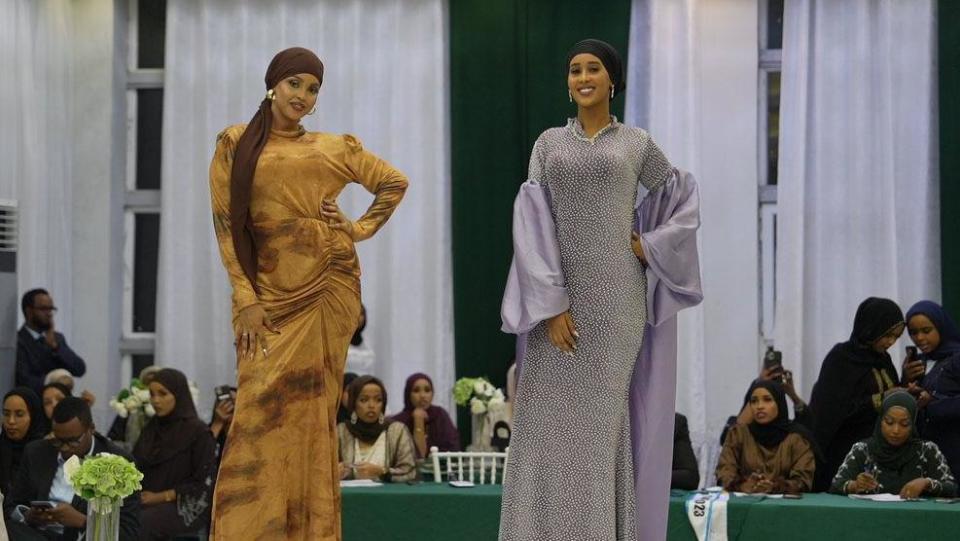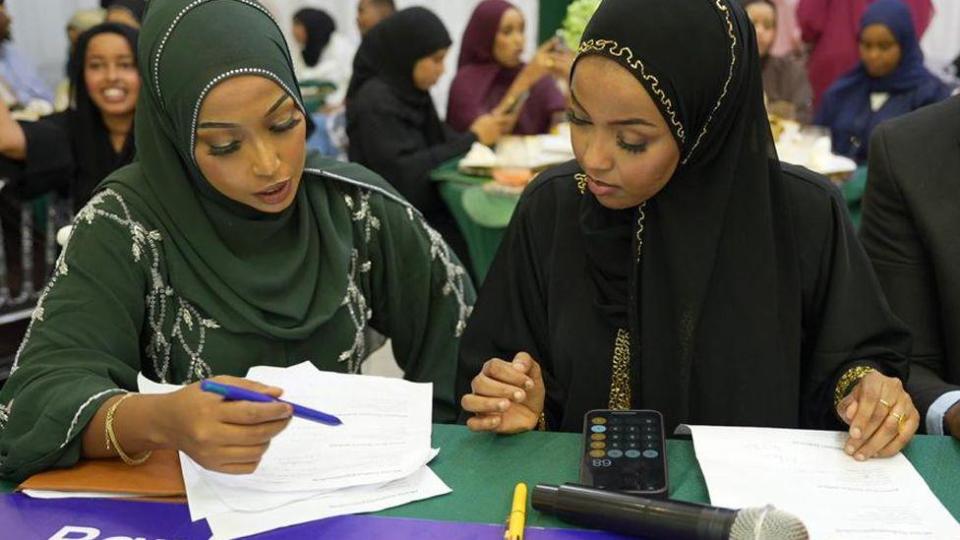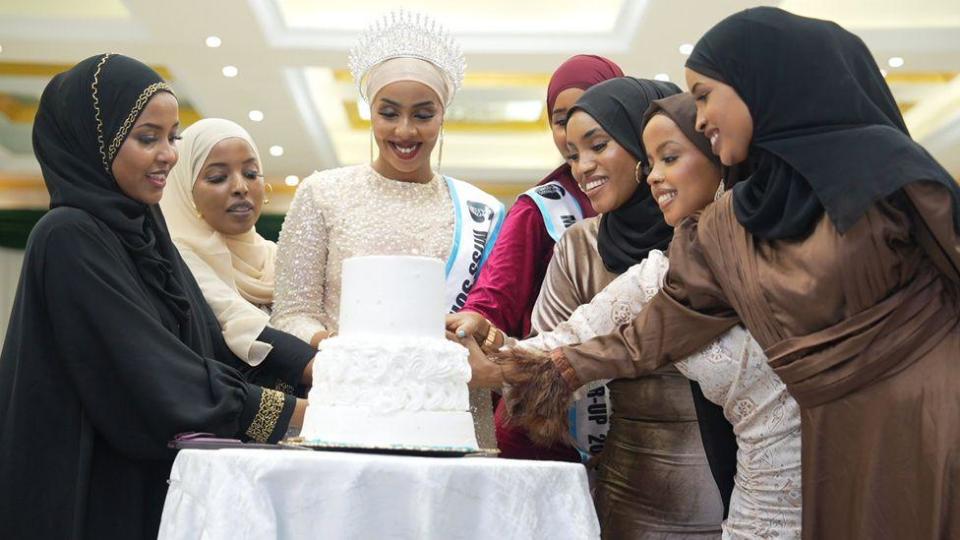While many people in Somalia crammed into cafes and homes on Sunday night to watch the Euro football final, hundreds of Mogadishu’s most fashionable residents gathered at the seaside Elite Hotel for another competition: Miss Somalia.
The fact that, about a kilometer away, a car bomb exploded in front of the Top Coffee restaurant, which was packed with football fans, highlights the dramatic contrasts of life in Somalia.
As the beauty show contestants paraded around the hotel, at least five people were killed and around 20 injured in the nearby explosion.
The Islamist militant group al-Shabab, which has controlled much of Somalia for more than 15 years, said it carried out the attack.
Hani Abdi Gas founded the Miss Somalia pageant in 2021, a brave thing to do in a culturally conservative country full of Islamic militants. Somalia has regularly topped the list of the worst places in the world to be a woman.
Ms. Gas grew up in Kenya’s Dadaab refugee camp, along with hundreds of thousands of other Somalis who fled war and drought. She returned to her homeland in 2020.
Although the pageant is about beauty, Gas said the inspiration behind the pageant was to lift women’s voices and bring them out of isolation.
“It promotes unity and empowerment,” she said.
Ms Gas believes it is time for Somalia to join the rest of the world when it comes to beauty pageants. “I want to celebrate the aspirations of women from diverse backgrounds, boost their confidence and give them the opportunity to showcase Somali culture around the world.”
This year’s competition certainly represented women from different walks of life. One of the contestants was a police officer.

Many in Somalia find the idea of beauty pageants appalling.
Some see them as an affront to Islam and Somali culture. Others say they are another form of gender abuse, reducing women to objects.
“I am disgusted by the idea of our young women competing in this terrible competition,” said clan leader Ahmed Abdi Halane.
“These things are against our culture and our religion. If a girl wears tight clothes and appears on stage, it will embarrass her family and her clan. Women should stay at home and wear modest clothing.”
Some women are also opposed to beauty pageants.
“It’s good to support Somali youth, but not in a way that conflicts with our religion,” said student Sabrina, who declined to reveal her last name.
“It is not appropriate for a woman to appear in public without covering her neck and that is what the Miss Somalia contestants did.”
Unlike the sombrely colored cloaks and veils worn by many Somali women, the Miss Somalia contestants wore extravagant, form-fitting dresses.
Dressed in a long gold dress with floor-length sleeves, 24-year-old Aisha Ikow was crowned Miss Somalia and took home a cash prize of US$1,000 (£770).


She is a college student and makeup artist and represented the state of Southwest. The other finalists were regional beauty queens from Jubaland in the south and Galmudug in central Somalia.
“I will use this as an opportunity to fight against early marriage and promote girls’ education,” said Mrs. Ikow.
“The competition celebrates the culture and beauty of Somalia while shaping a better future for women.”
The six judges, five women and one man, had difficulty choosing the winner.
The panel included the founder, Ms. Gas, youth ministry representative and Miss Somalia 2022. They judged the contestants according to their physical beauty, the way they walked the catwalk, the way they dressed and the way they spoke in public.
There was also an online vote open to the public.
Voting cost $1, with the money raised used to finance the event in Mogadishu and trips abroad to compete in the Miss Africa, Miss World and Miss Universe competitions.


The nightly parade at a luxury beachfront hotel was a far cry from the lives of most people in Somalia, especially women.
Four million Somalis, around a quarter of the population, live elsewhere in the country after being forced to flee their homes.
The UN estimates that between 70% and 80% of them are women.
In 2024, enough data was collected for Somalia to be included in the United Nations Human Development Index for the first time in three decades. It arrived last.
Somalia ranks fourth from the bottom in the UN Gender Inequality Index. Aid groups say 52% of women in the country have experienced gender-based violence. Around 98% suffer female genital mutilation.
Traditionally, when a man raped a woman, his “punishment” was having to marry the woman he had sexually assaulted. Attitudes towards rape and other forms of abuse against women have not changed much over the years.
In 2013, a woman in Mogadishu was sentenced to a year in prison after reporting that she had been raped by members of the security forces.
In the self-proclaimed republic of Somaliland, religious leaders annulled a 2018 sexual crimes law almost immediately after it was signed. The revised version does not protect women from child marriage, forced marriage, rape or other forms of sexual abuse.
But the fact that a Miss Somalia pageant can be held in Mogadishu, even a kilometer away from a suicide bombing, shows that the country is changing both in terms of attitudes and security.
A beauty pageant would have been unthinkable a few years ago, especially when Al-Shabab controlled the capital.
The crowd at the Elite Hotel only left in the early hours of the morning. They did not hear the sound of the nearby attack, as it was drowned out by the noise of the Indian Ocean waves crashing onto the beach.
Kiin Hassan Fakat is a reporter for Bilan Media, an all-female news group in Somalia.
Mary Harper has written two books about Somalia, including Everything You Have Told Me Is True, a look at life under al-Shabab.
More BBC stories from Somalia:


Go to BBCAfrica.com for more news from the African continent.
Follow us on Twitter @BBCAfricaon Facebook at BBC Africa or on Instagram at bbcafrica































